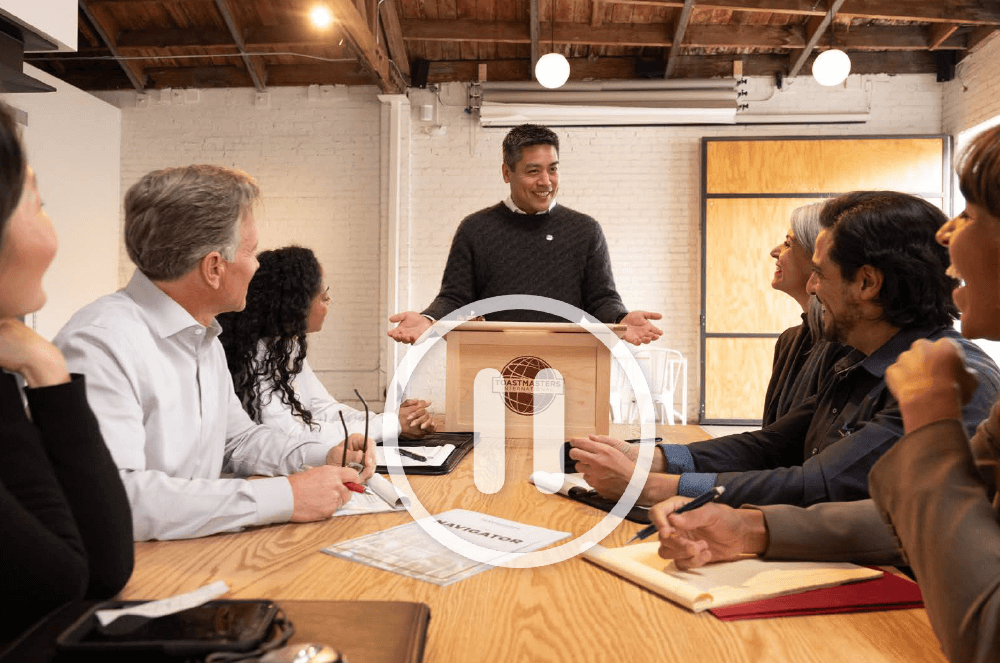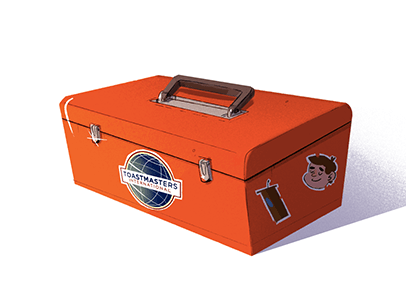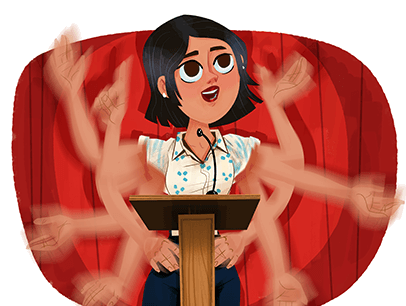
If silence is golden, pausing is a golden ticket, because it activates silence as a powerful tool for all communicators, whether they’re giving a convention speech to hundreds or sharing ideas with a small team. But while some of the benefits of pausing are well-known in communication circles, others may surprise you.
Read on to learn more about the great powers of the pause, including some that will almost certainly give you pause!
1 Pausing puts your mind in charge of your mouth.
For many of us, our mouths run ahead of our minds—you’re saying things before you’ve fully conceived the phrasing, resulting in rambling, redundant, and often incoherent word salads.
Pausing enables you to reverse that order, so your mind runs ahead of your mouth, laying a logical groundwork of thoughtfully curated words and ideas for your mouth to say. Put another way, pausing allows your mind to script your mouth.
We can test this. Answer this question out loud in the form of a few complete sentences:
What is one of the things you like about your job?
Done?
Now do the same thing with the following question, but this time, take as much time and use as many pauses as you need to let your mind work.
What is one of the things you dislike about your job?
Was answering the second question easier? Was the answer better? Could you feel your mind saying, “thanks for letting me do my thing”?
As you can imagine, this exercise is very valuable for job interviews.
2 Pausing gives the audience time to process.
It takes at least twice as long for your audience to process your point as it takes for you to say it. Why? Because while you’re very familiar with what you’re saying, the audience is hearing it for the first time. Pausing gives them time to not only hear your point, but digest it, understand it, evaluate it, determine its relevance, and apply it. Without a pause, they’re still doing that cognitive work while you’re already onto your next point.
This processing time also makes your points easier to recall. Consider your points like water poured over soil—it takes time for them to sink deep.
3 Pausing draws and holds attention.
Pausing creates small but powerful moments of drama and suspense, making your audience instinctively wonder what will come next. Like watching a suspenseful movie, they think, What will happen next? What will break this silence?
They’re now hooked until your next word. This is why effective speakers often pause just before they make their most valuable points:
We can solve this problem ...
(pause)
… by combining our five key objectives into one unifying goal.
(pause)
Let me show you how.
4 Pausing looks like thinking.
Used confidently, pausing during a presentation or a meeting can look like live thinking, which can be exciting for an audience—similar to the anticipation of live theater or sporting events. When an audience sees a speaker taking a moment to think, it conveys that they’re receiving the best of the speaker’s knowledge and insight, not just the best of their notes.
Just make sure you’re looking directly into the eyes of your audience—not at notes or a PowerPoint slide—to create that nearly hypnotic effect.
5 Pausing puts power behind key ideas.
Have you heard a classical song stop suddenly, then hit a huge crescendo? It’s the combination of silence and noise that produces that aural impact. Similarly, a moment of silence in your presentation draws immense attention to what comes next.
But don’t squander that power. Use it deliberately—not randomly—to emphasize your most important points and ideas. Like that crescendo, points preceded by pauses land harder and are remembered longer.
6 Pausing controls speed.
If you’re a naturally fast talker—which can overwhelm an audience—pausing slows you down by immediately dropping your speaking speedometer to zero. Yes, you may accelerate again, but each time you pause, it halts that inertia. And the more comfortable you feel pausing, the more competently you’ll be able to control your rate overall, like instinctively using the brakes in your car.
7 Pausing lets you breathe.
Breathing not only keeps you alive, it also calms you down. And if you’re very excited or nervous, it’s easy to run out of breath while speaking. Pausing gives you time to draw that refreshing and valuable breath. Just keep your mouth closed and breathe through your nose so that you inhale and exhale as silently as possible. Taking breaths while speaking is a secret between you and your body.
8 Pausing defeats crutch words.
One of the most practical uses of the pause is to conquer tendencies to use crutch words like “um,” “ah,” and “uh,” which, as meaningless fillers, can damage your credibility.
Pausing creates small but powerful moments of drama and suspense.
The key to stop using filler words is to replace them with pauses. Why are pauses better? Because nonsense words call attention to themselves; moments of silence do not. With practice, you can train your brain to sense when a nonsense word is coming and intervene to insert a pause in its place.
9 Pausing costs you nothing.
It may be tempting to assume that if you pause, the audience will think you’ve forgotten what you intended to say, like an actor forgetting their lines. The pause also feels awkward—your mind is thinking: Shouldn’t I be speaking right now? Shouldn’t someone be speaking?
But few audiences respond to a presentation or a meeting share by saying the speaker “paused too much.” This is because pausing—a moment of nothingness versus nonsense—is hard to remember, let alone criticize. When I encourage one of my students or clients to insert more pauses in their presentation, I then ask the group how many pauses they noticed. The speaker will typically say, “too many,” while the observers will say, “maybe one or two.”
I often joke that pauses are like your sophomore year of high school: No one remembers it because, well, nothing remarkable happened during that time. (Your high school mileage may vary.)
So use pauses to let your mind script your mouth, help your audience process your points, build suspense, seem spontaneous, and ultimately … (pause) … convey your points with precision and impact.
Joel Schwartzberg is a presentation coach, executive communication specialist, and author of The Language of Leadership: How to Engage and Inspire Your Team and Get to the Point! Sharpen, Simplify, and Sell Your Message. Follow him on LinkedIn.
Related Articles

Presentation Skills
Silence Is Golden

Presentation Skills
How To Quit Talking Quickly

Presentation Skills



 Previous
Previous

 Previous Article
Previous Article